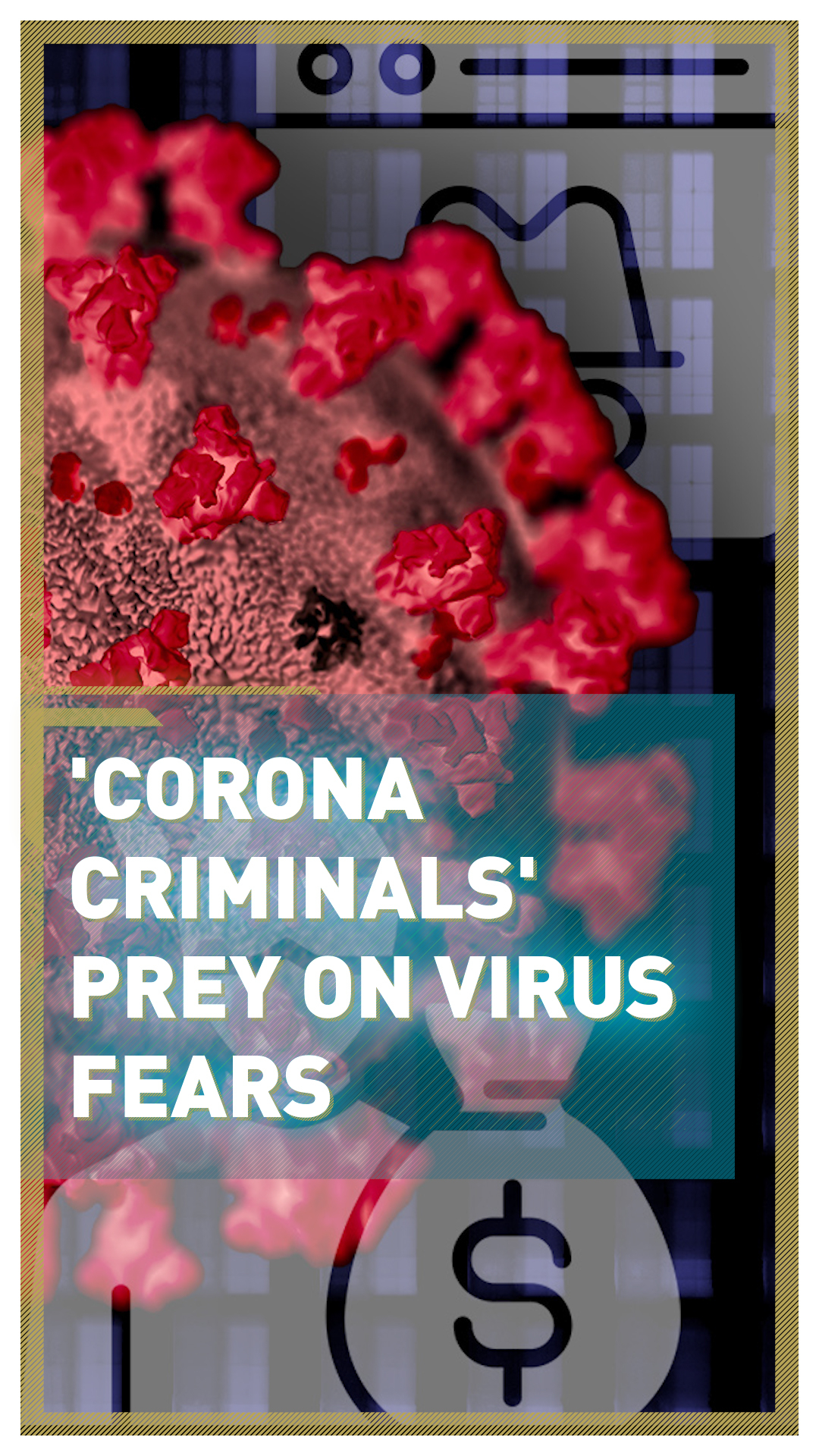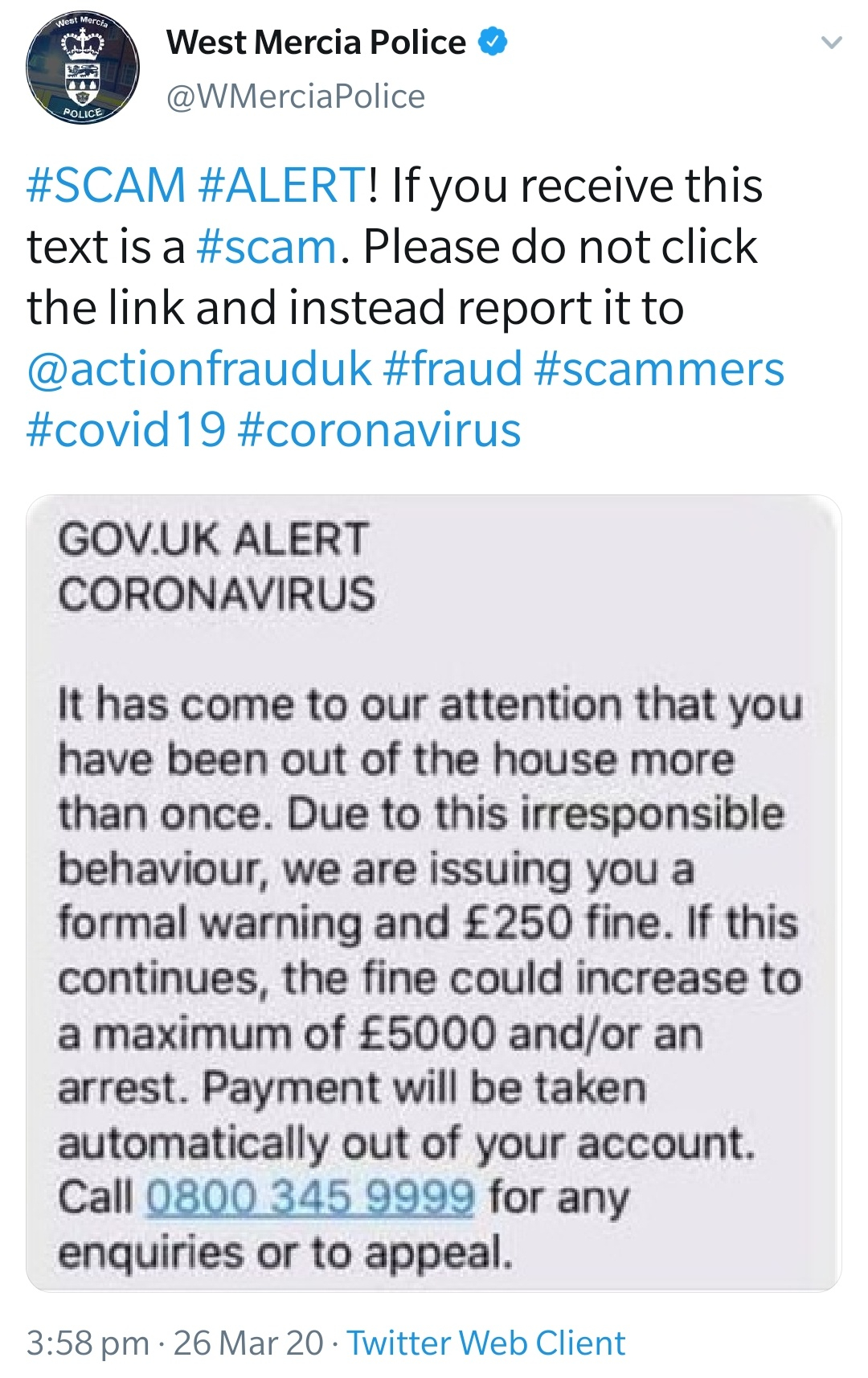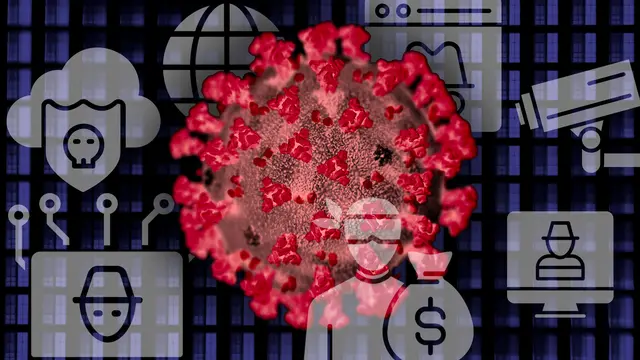01:51

Criminal activity doesn't stop, even while the world is grappling with the COVID-19 pandemic. Instead, criminals are finding new ways to profit from the crisis.
From the sale of counterfeit and substandard healthcare products, to online and telephone fraud schemes and even impersonating healthcare workers to access homes and steal valuables, criminals are adapting their traditional activities.
In a recent report, Europe's police agency Europol, warned of "pandemic profiteering," explaining how criminals have and will continue to exploit the COVID-19 crisis.
"We see it all the time with criminals," Europol executive director Catherine De Bolle told AFP. "The only thing they are interested in is 'how can I make more money?'" she added.
Change in crime since the COVID-19 outbreak
Governments across Europe have implemented measures to fight the spread of COVID-19, including ordering millions of people to stay at home, imposing nationwide lockdowns, closing borders and restricting travel.
In several countries, police have reported a dramatic drop in "traditional" common criminal behavior since these measures were enforced.
Spanish police said there had been a roughly 50 percent drop in criminal offences compared with a year earlier, since the country was put on a near total lockdown on 14 March. "There is no doubt that confinement makes crime more difficult," said the deputy director of Spain's Guardia Civil police force, Laurentino Cena.
Sweden also noted burglaries had dropped since people were asked to work at home.
Sales of street drugs have also fallen sharply in many countries since the outbreak, as criminals are finding it difficult to physically move illicit goods without being detected.
However, Europol says these measures are also having an impact on the serious and organized crime landscape due to several factors that have changed how criminals operate.
These include – high demand for certain goods, protective gear and pharmaceutical products; citizens remaining at home and increasingly relying on digital solutions; increased anxiety and fear causing vulnerability to exploitation; limitations to public life making some criminal activities less visible and moving them to home or online settings; decreased supply of certain illicit goods in the EU.
So, although common crimes may be decreasing, the flip side is that criminals are now finding new ways to exploit and profit off the back of the disease.
Criminals are finding new ways to make money out of the coronavirus outbreak. /Piero Cruciatti/AFP
'Corona crimes' to look out for
"This is unacceptable: such criminal activities during a public health crisis are particularly threatening and can carry real risks to human lives," Europol's De Bolle said.
Based on information from EU member states and in-house expertise, Europol found the current developments fall into four main crime categories.
- Organized property crimes
Police across Europe have warned people, especially the elderly, to be on the lookout for burglars impersonating healthcare workers and claiming to be conducting COVID-19 tests to steal from homes.
An example presented by Europol was a case from an EU member state in which perpetrators called a victim informing them that a relative is infected and in hospital. They claimed doctors would have to come and take an immediate "corona test."
These fake doctors came to the victim's home in protective clothing and masks in the middle of the night. The suspects then took an apparent swab sample from the victim's mouth and wiped his forearms with apparent strips of paper to test it. He was then told that the evaluation of the test would take about five hours.
Europol said these types of property crimes involving impersonations of public authority figures are expected to increase further during the crisis.
It added that commercial premises and medical facilities are also expected to be increasingly targeted for organized burglaries.
In Denmark, the government has promised high sentences for burglars posing as health workers of paramedics as well as people who steal hydro-alcoholic gel.
- Counterfeit and substandard goods
The sale of fake healthcare, hygiene and pharmaceutical products as well as faulty protective equipment has increased significantly since the coronavirus outbreak.
High demand for these products, which include masks, gloves and cleaning products, is creating a substantial market for counterfeiters and profiteers and people everywhere are falling prey to it.
A global operation to target trafficking counterfeit medicines was coordinated by Interpol with Europol's support between 3 and 10 March. Operation Pangea resulted in the seizure of 13 million euros ($14.5 million) worth of potentially dangerous pharmaceuticals, 4.4 million units of illicit pharmaceuticals and 37,000 unauthorized and counterfeit medical devices – 34,000 of which were surgical masks.
Police officers identified more than 2,000 links to products related to COVID-19, and the operation revealed a worrying increase in unauthorized antiviral medications and the antimalarial chloroquine.

Counterfeit medication is being sold online by criminals looking to profit from the virus pandemic. /Gerard Julien/AFP
- Fraud
"Fraudsters have been very quick to adapt well-known fraud schemes to capitalize on the anxieties and fears of victims throughout the crisis," Europol's report says.
These schemes include various types of adapted versions of telephone fraud schemes, supply scams and decontamination scams, which have the potential for causing substantial financial damage to citizens, businesses and public organizations.
But across Europe, several agencies and police forces have said that online fraud is exploding.
"Businesses seeking to purchase supplies such as protective masks and other equipment are being targeted by scammers," Europol found.
An example presented was an investigation by an EU member state into the transfer of 6.6 million euros ($7.37 million) from a company to another company in Singapore to purchase alcohol gels and FFP2 and FFP3 masks. These goods were never received.
The World Health Organization (WHO), which is at the forefront of the fight against the pandemic, has also warned of a sharp increase in email phishing and scams using its name to try to steal money and sensitive information.
Britain's National Crime Agency said criminals "target people who seek to buy medical supplies on the internet, sending emails offering fake medical support and defrauding people who may be vulnerable or increasingly isolated at home."
The UK also reported incidents of a scam text being sent around telling people they have been fined £250 for leaving the house "more than once." The message also says the charge could increase to £5,000 and/or arrest, and tells the receiver to call a number to appeal the decision.

Fraud crimes have been on the rise since COVID-19 measures were implemented. Screengrab / West Mercier Police
- Cyber crime
Austria's interior minister, Karl Nehammer, said this week that: "We see a decrease in breaks-ins, burglaries, but at the same time cyber crime is on the rise."
In Germany, too, "cyber criminals are exploiting people's current concerns about COVID-19 to send phishing emails with malicious content or use this fear with fraudulent intent," police said.
Europol said the number of cyber attacks against organizations and individuals is significant and is only expected to increase as more businesses allow individuals to work from home.
It adds that there is already a long list of attacks by cyber criminals exploiting the need for information, "including phishing campaigns that distribute malware via malicious links and attachments, and execute malware and ransomware attacks that aim to profit from the global health concern."
In one example, Europol said criminals carried out a cyber attack on Czechia's Brno University Hospital, forcing it to shut down its entire IT network and postpone urgent surgeries, rerouting new acute patients to a nearby alternative hospital.
Additionally, there was a rising threat of sexual predators seeking child abuse material online and preying on young people who are spending more time in isolation in front of screens at home, officials warned.
'The worst in humanity'
Europol has warned that crimes like the above will only increase as restrictions continue and criminals find new ways to exploit the situation.
Other crimes have also been reported, including fears of a surge in domestic violence as families are confined to their homes.
Some French police stations have seen a more than 30 percent increase in such reports since the country's lockdown began on 17 March, according to Interior Minister Christophe Castaner.
Europol says there are some concerns that the closure of establishments offering legal sex work may increase the number of incidents of sexual exploitation.
The outbreak is also behind a rise in anti-social behaviour, as Britain's National Police Chiefs Council warned that the pandemic "could bring out the worst in humanity," citing the theft of oxygen cylinders at a Manchester hospital.
Police in Britain and Austria have recently arrested people for coughing or spitting on people while claiming to be infected.
The UK's public prosecutions chief recently announced that coughing or spitting at key workers – or threatening to do so – can now be considered crimes. Criminals would be charged with common assault, which in England and Wales can lead to six months in prison. Attacks against emergency workers going about their duties can also carry a maximum sentence of two years.
 简体中文
简体中文

